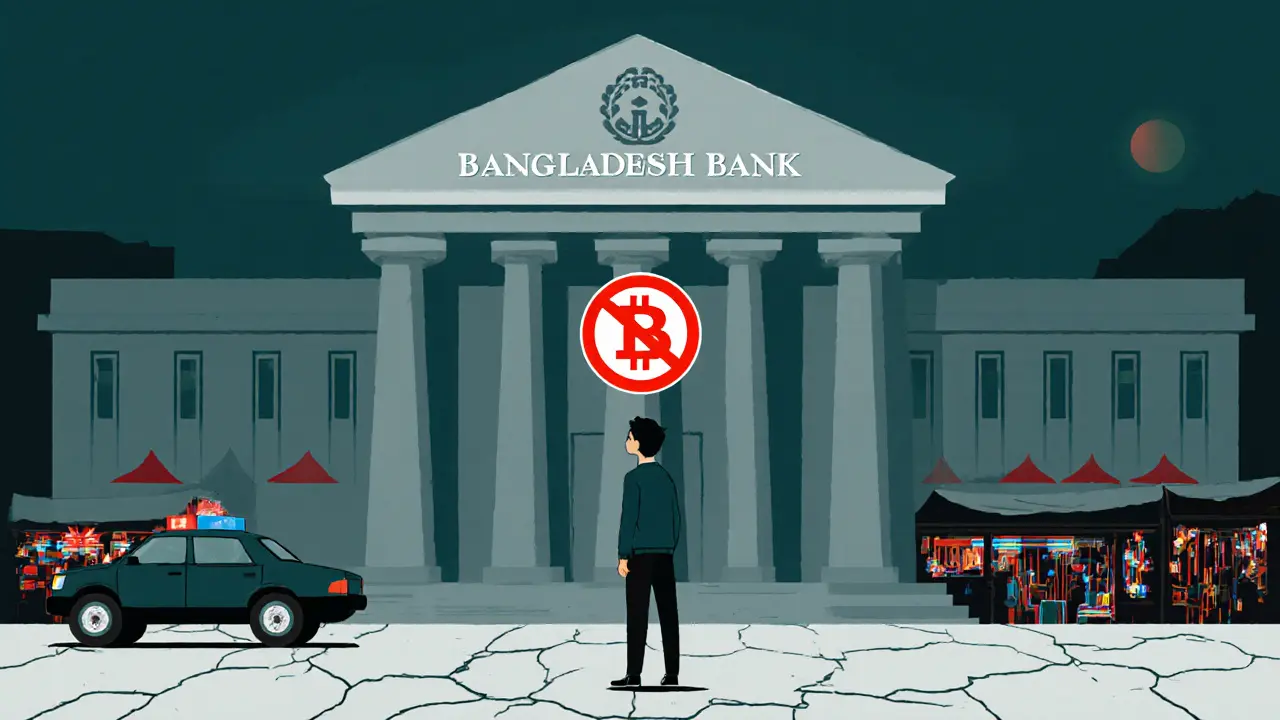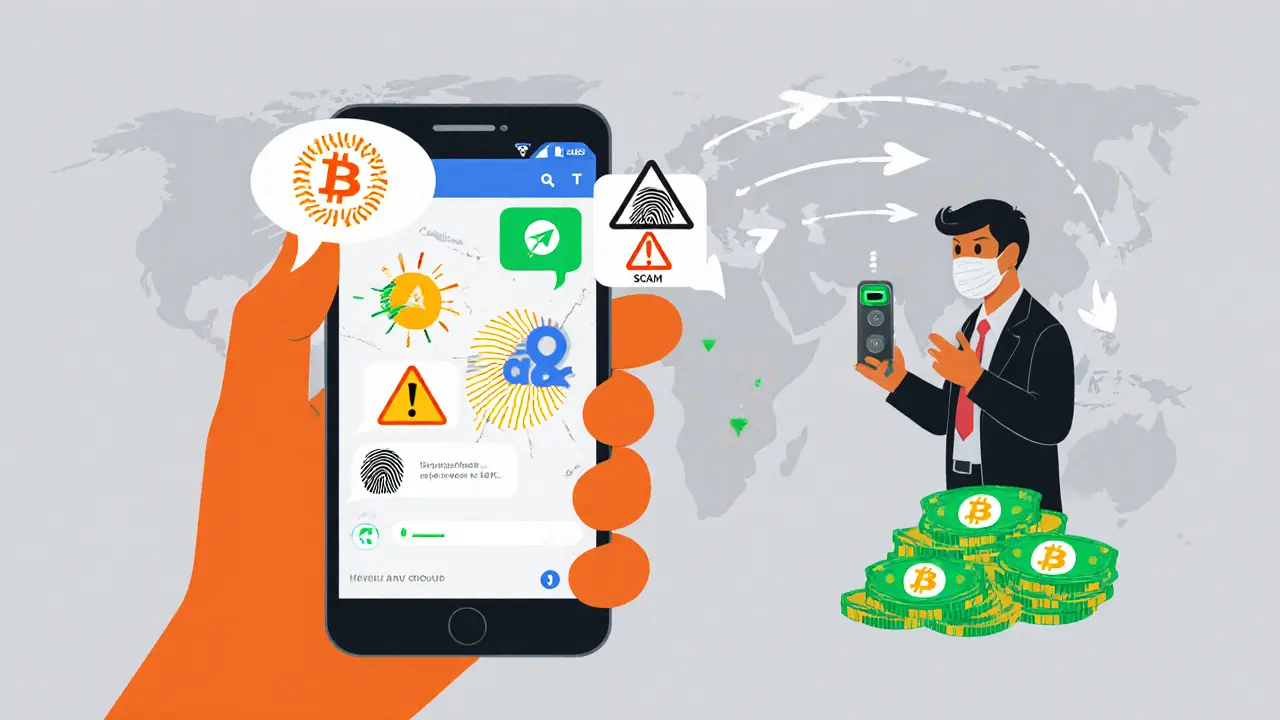Crypto Trading Risks for Bangladesh Citizens - What You Need to Know
 Jan, 9 2025
Jan, 9 2025
Crypto Trading Risk Calculator
Your Investment
Important: This calculator estimates potential losses based on the article's findings about Bangladesh's crypto trading risks. The actual risks may vary significantly based on your trading methods, security practices, and enforcement patterns.
Risk Summary
Estimated Total Loss
0 BDT
Bangladesh has become one of the toughest places on Earth for anyone who dares to dabble in crypto trading Bangladesh risk. The government’s hard‑line stance, combined with a shadowy underground market, creates a perfect storm of legal, financial and operational dangers. If you’re a Bangladeshi citizen thinking about buying Bitcoin, USDT or any other digital asset, you need to know exactly what you’re walking into.
Legal Landscape: Why Crypto Is Illegal
Bangladesh Bank is the country’s central bank and the authority that issued the 2017 proclamation that outright bans the possession, usage and trading of cryptocurrencies. The ban is anchored in the nation’s anti‑money‑laundering (AML) legislation, which treats any crypto‑related activity as a criminal offence. Violations can lead to prosecution, fines, and even imprisonment, although enforcement has been uneven.
Since the ban, the government has doubled down. The 2025 regulatory framework introduced mandatory biometric verification for any financial service that might touch crypto‑related funds. In practice, that means local exchanges that tried to comply lost roughly 30 % of their users overnight as traders fled to unregulated Telegram groups.
Financial Risks: From Banking Scrutiny to Fraud
Even if you manage to evade the police, the money side of crypto trading is fraught with danger. There are two main ways Bangladeshi traders acquire digital assets:
- Using international credit or debit cards billed in US dollars. Banks can trace these transactions, flag them under AML monitoring, and alert the Bangladesh Bank.
- Working with local “agents” who buy and sell Bitcoin, USDT and other coins for Bangladeshi Taka (BDT). These agents operate without any licensing, which means they can disappear with your funds, manipulate prices, or charge hidden commissions.
Because the activity is illegal, you have no legal recourse if an agent cheats you. In many cases, victims report losing the entire investment with no way to recover it.
Operational Threats: P2P Networks, Telegram Scams, and Mining Bans
P2P trading platforms have exploded in Bangladesh. Record‑high volumes indicate that billions of BDT are moving through peer‑to‑peer channels each month. While these networks provide a lifeline for traders, they also amplify fraud risk because there’s no central oversight.
Telegram groups have become the go‑to “exchange” for many. Unfortunately, these chats are hotbeds for pump‑and‑dump schemes, fake wallet addresses, and ransomware attacks. Without any consumer‑protection framework, a single typo can send your coins to a hacker’s address forever.
Mining, once a modest side‑hustle, is now completely outlawed. Grid operators celebrate the crackdown, but a handful of clandestine farms in Chittagong keep running, hidden behind retrofitted ventilation systems. If discovered, operators face severe penalties, and any associated traders could be implicated by association.
Tax Uncertainty: Paying for an Illegal Activity
The National Board of Revenue (NBR) applies the 1984 Income Tax Ordinance to crypto gains, even though the activity itself is prohibited. This creates a paradox: you may be fined for not reporting earnings from something the state deems illegal. The lack of clear guidance means many traders either under‑report and risk penalties or avoid reporting altogether and risk legal action if discovered.

Comparative View: Why Bangladesh Stands Alone
Neighbouring India has moved toward a regulated approach, imposing a 30 % tax on crypto earnings and a mandatory 1 % TDS on transactions. Pakistan, on the other hand, is building Bitcoin reserves and drafting a formal crypto policy. Bangladesh’s absolute ban leaves its citizens without any legitimate avenue to trade, forcing them into higher‑risk underground alternatives.
Technical and Security Hazards
Because regulated exchanges are off‑limits, Bangladeshi traders rely on international platforms like Binance or KuCoin. While these apps are available on Google Play and the App Store, they don’t provide the consumer‑protection guarantees that domestic, compliant exchanges would. If your account is frozen or your funds are seized, you have little recourse.
Local agents often ask traders to store coins in simple mobile wallets with weak encryption. This opens the door to phishing attacks, malware, and SIM‑swap fraud. The lack of two‑factor authentication (2FA) or multi‑signature safeguards means a single compromised device can wipe out an entire portfolio.
Socio‑Economic Ripple Effects
Beyond personal loss, crypto involvement can jeopardize your standing with traditional banks. Once a bank discovers a client’s crypto activity-typically through AML monitoring-the institution can close accounts, deny loans, or blacklist the individual from future credit. This financial marginalisation hampers access to mortgages, business financing, and even basic banking services.
On a macro level, the steady outflow of BDT to offshore stablecoin platforms weakens the domestic currency and fuels capital flight. Analysts warn that continued erosion could pressure the Central Bank’s foreign‑exchange reserves, ultimately affecting inflation and economic stability.
Future Outlook: Risks Are Likely to Grow
The 2025 regulatory package has not softened the stance; it has added biometric checks and tighter AML reporting requirements. Enforcement agencies have upgraded their surveillance capabilities, meaning that today’s “underground” activity is more visible to the authorities than ever before.
Experts agree that unless the government fundamentally revises its policy, Bangladeshi citizens will face escalating legal and financial jeopardy. Retroactive enforcement, broader financial surveillance, and harsher penalties are all plausible scenarios as the state attempts to clamp down on the illicit flow of capital.
Bottom‑Line Checklist for Bangladeshi Crypto Enthusiasts
- Know the law: Crypto possession, trading, and mining are illegal under Bangladesh Bank regulations.
- Assess legal exposure: Using foreign cards or local agents can trigger AML investigations.
- Watch for scams: Telegram groups and unverified agents lack any consumer protection.
- Plan for tax: The NBR may tax unreported crypto gains despite the ban.
- Secure your assets: Use hardware wallets, enable 2FA, and avoid storing large sums in mobile apps.
- Consider alternatives: If you need digital financial services, explore regulated options in nearby jurisdictions rather than risking illegal activity at home.
Next Steps if You’re Already Involved
If you’ve already bought crypto, start by moving your holdings to a hardware wallet you control. Document every transaction in case you need to demonstrate good‑faith effort if legal questions arise. Consider consulting a lawyer familiar with Bangladesh’s AML laws to understand your exposure.
Finally, keep a close eye on any new government announcements. Policy shifts happen rarely, but a sudden crackdown could make existing holdings a target for seizure.
Is crypto really illegal in Bangladesh?
Yes. Bangladesh Bank declared in 2017 that any form of cryptocurrency usage, trading, or possession is prohibited under the country’s AML laws.
What are the possible legal penalties?
Penalties can include hefty fines, seizure of assets, and imprisonment. Enforcement varies, but courts have prosecuted offenders under the Anti‑Money Laundering Act.
Can I be taxed on crypto profits?
The National Board of Revenue applies the general Income Tax Ordinance to crypto gains, even though the activity is illegal. This creates tax liability and potential penalties for unreported earnings.
What security steps should I take?
Store crypto in a hardware wallet, enable two‑factor authentication, avoid cheap mobile wallets, and never share private keys. Use strong, unique passwords for any platform you access.
Is there any safe way to trade crypto from Bangladesh?
Legally, no. The safest route is to refrain from crypto activities altogether or use regulated services in a jurisdiction where crypto is legal.
Wayne Overton
October 25, 2025 AT 10:54Crypto in Bangladesh? Just don't do it. Period.
Alisa Rosner
October 25, 2025 AT 11:47⚠️ This is super important for anyone thinking about trading crypto from Bangladesh! 🚨 Even if you think you're being smart with Telegram groups or agents, you're playing with fire. 💥 Your money, your safety, your future - all at risk. Use hardware wallets if you must, but seriously, just avoid it. 🛑❤️
MICHELLE SANTOYO
October 25, 2025 AT 11:56They say it's illegal but they also tax it? That's not a law, that's a contradiction wrapped in bureaucracy. The state wants your money but won't let you earn it legally. Welcome to the dystopia. 🌍💸
Lena Novikova
October 25, 2025 AT 17:11Stop acting like Bangladesh is the only country with problems. Every government is corrupt. The real issue is people who think they can outsmart the system. You think your Telegram group is safe? You're the mark. Get real.
Olav Hans-Ols
October 26, 2025 AT 10:58I get why people are tempted - the world’s moving digital and Bangladesh feels left behind. But this post lays it out so clearly: the risks aren't worth it. If you're serious about crypto, go to India or Thailand for a bit, trade there legally, then come home. Safety first, always.
Kevin Johnston
October 27, 2025 AT 10:01Stay safe out there 🙌❤️
Dr. Monica Ellis-Blied
October 27, 2025 AT 16:45Let me be absolutely clear: the National Board of Revenue’s stance on taxing crypto gains - despite the ban - is not merely inconsistent, it is legally indefensible and ethically indefensible. The state cannot simultaneously criminalize an activity and claim jurisdiction over its profits. This is not governance; it is extortion dressed as fiscal policy. Anyone engaging in crypto under these conditions is not a trader - they are a hostage to systemic hypocrisy.
Herbert Ruiz
October 27, 2025 AT 23:43Why is this even a topic? It's illegal. End of story. Stop overcomplicating it.
Saurav Deshpande
October 28, 2025 AT 16:36They banned crypto because they know it exposes the entire banking system as a scam. The central bank is just afraid people will realize their Taka is worthless. This isn't about money laundering - it's about control. They'd rather you starve than be free. The real crime is the ban itself.
Paul Lyman
October 29, 2025 AT 07:01Hey if you're already in crypto just move it to a cold wallet like now!! And stop using those sketchy apps. I lost my whole stash once because I trusted a Telegram guy. Don't be me. You got this 💪
Frech Patz
October 29, 2025 AT 10:20Could you clarify the legal precedent under which the National Board of Revenue asserts jurisdiction over illicit financial activities? Specifically, how does the 1984 Income Tax Ordinance apply to transactions that are, by statutory definition, void ab initio under the Anti-Money Laundering Act? This presents a conflict of legal doctrines that warrants judicial review.